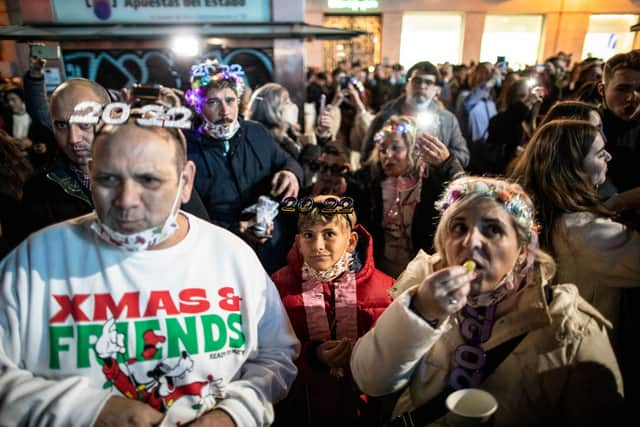New Year's traditions from all over the world: From eating grapes, smashing plates and first footing
People in this article
and live on Freeview channel 276
New Year's Eve or Hogmanay, as the Scots call it, has many traditions around the world - here's the background to some of them.
Jools Holland is the master of presenting a UK music show to see in the new year and has been hosting his annual broadcast Hootenanny since 1992 on BBC2. His big-name guests, as well as the emerging acts being showcased, have made him synonymous with the new year.
Advertisement
Hide AdAdvertisement
Hide AdScotland knows how to throw a New Year's Eve party, to the extent that they need two bank holidays to recover (January 1 and January 2 are bank holidays for the Scots). People from all over the world come to Edinburgh for the street party with fireworks across the city and looking particularly impressive beside the castle.
They have a few traditions for January 1 in Scotland. Once the clock has struck midnight, according to Scottish beliefs, the first person who crosses through the threshold of your house on New Year's Day should be a dark-haired male if you wish to have good luck in the coming year.


Traditionally, these men come bearing gifts of coal, salt, shortbread, and whisky, all of which contribute to the idea of having good fortune.
But why dark-haired men? Well, back when Scotland was being invaded by the Vikings, the last thing you wanted to see at your doorstep was a light-haired man bearing a giant axe. So today, the opposite is considered lucky - a dark-haired man, symbolising opulence and success.
Advertisement
Hide AdAdvertisement
Hide AdThe Loony Dook is another Scottish tradition which involves going into freezing water on New Year's Day. People dive into the freezing waters of the Firth of Forth at South Queensferry (north of Edinburgh, Scotland), often in fancy dress. The name "Loony Dook" is a combination of "Loony" (short for "lunatic") and "Dook", a Scots term meaning "dip" or "bathe".
Usually the Loony Dook will have thousands of participants and even more spectators. The event was conceived in 1986 as a joking suggestion by three locals for a New Year's Day hangover cure. The following year it was decided to repeat the event for charity.


In other parts of the world there are some equally, if not more bizarre, superstitions and events.
In Spain, locals will eat exactly 12 grapes at the stroke of midnight to honour a tradition that started in the late 19th century. Back in the 1800s, vine growers in the Alicante area came up with this tradition as a means of selling more grapes toward the end of the year, but the sweet celebration quickly caught on.
Advertisement
Hide AdAdvertisement
Hide AdToday, Spaniards enjoy eating one grape for each of the first 12 bell strikes after midnight in the hopes that this will bring about a year of good fortune and prosperity.
Italians have a tradition of wearing red underwear to ring in the new year. In Italian culture, the colour red is associated with fertility, and people wear it under their clothes in the hopes that it will help them conceive in the coming year.
The Danes like to smash plates to see in the new year. People take pride in the number of broken dishes outside of their door by the start of January 1.
It's a Danish tradition to throw china at your friends' and neighbours' front doors on New Year's Eve. Some say it's a means of leaving any aggression and ill-will behind before the New Year begins, and it is said that the bigger your pile of broken dishes, the more luck you will have in the upcoming year.
Advertisement
Hide AdAdvertisement
Hide AdThe Danes also like to stand on their chairs and 'leap' into January at midnight to bring good luck and banish bad spirits. They're a fun bunch the Danish!
An Irish custom is for single women to sleep with a mistletoe under their pillow on New Year's Eve. Supposedly, sleeping with the plant helps women to find their future husbands, in their dreams, at least.
A general tradition across the globe, pre-pandemic anyway, was to give a kiss to your nearest humans when the clock strikes midnight. According to the Washington Post, the tradition comes from English and German folklore, which believed that it's "the first person with whom a person came in contact that dictated the year’s destiny." Choose your partner wisely!
Comment Guidelines
National World encourages reader discussion on our stories. User feedback, insights and back-and-forth exchanges add a rich layer of context to reporting. Please review our Community Guidelines before commenting.
